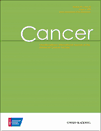
Favorable Cardiovascular Risk Among Elderly Breast Carcinoma Survivors
Abstract
BACKGROUND: There are two reasons why women who survive breast carcinoma may be at a lower risk of developing coronary heart disease (CHD) compared with women without a history of breast carcinoma. First, estrogens may be etiologic in the development of breast carcinoma and protective of CHD. Second, a common therapy for breast carcinoma (tamoxifen) may be associated with cardiac protection.
METHODS: In this population-level cohort study, the authors analyzed data from the National Cancer Institute's Surveillance, Epidemiology, and End Results (SEER)-Medicare program to study the cardiac risk of elderly female Medicare beneficiaries with and without a history of breast carcinoma. Using the SEER file, the authors identified elderly women survivors of Stage 0, I, or II breast carcinoma (n = 5980) diagnosed between the ages of 55 and 64. Using the Medicare 5% noncancer file, the authors also identified elderly women without a history of cancer (n = 23,165). They followed women from age 67 for up to 5 years for hospitalization for acute myocardial infarction (AMI) through a review of Medicare claims. The authors controlled the analyses for race, socioeconomic status, geographic location, cohort entry year, and medical comorbidity.
RESULTS: The hazard of hospitalization for AMI for breast carcinoma survivors relative to comparison patients was 0.66 (95% confidence interval, 0.49–0.88). This apparent cardioprotective effect of breast carcinoma survivorship was stronger in breast carcinoma survivors with documented cardiac risk factors.
CONCLUSIONS: Survivors of early-stage postmenopausal breast carcinoma are at a significantly lower risk of hospitalization for AMI than women who do not have a history of breast carcinoma. That survivors' risk varies with previous cardiac risk factors may be consistent with effects of selective estrogen receptor modulators. This phenomenon should be evaluated further with individual-level data containing information on patient cardiac risk factors and tamoxifen use to help clarify the mechanism behind the risk reduction.
Citation:
E.B. Lamont, N.A. Christakis, and D.S. Lauderdale, "Favorable Cardiovascular Risk Among Elderly Breast Carcinoma Survivors" Cancer, 98(1): 2-10 (July 2003)